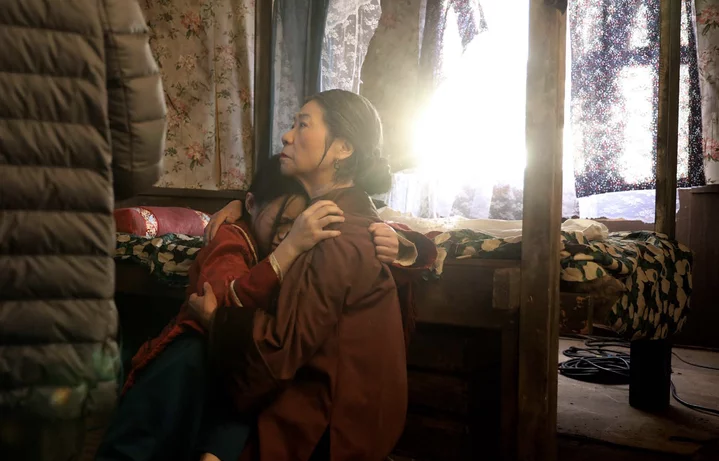Promotional image for Eureka, a short film directed by L.A.-based writer/director Miida Chu.
###
A new short film, described by its director as a historical drama-thriller, introduces audiences to 18-year-old Longlong, an indentured Chinese prostitute living under the thumb of an abusive brothel madam on the eve of the 1885 Chinese expulsion from Eureka.
Miida Chu, a Los Angeles-based writer/director, was traveling across rural America in 2019 when she began gathering bits and pieces of the largely forgotten history of immigrants to the United States, including Chinese citizens who fled their homeland during the North China famine of 1876-79.
“Then I started to discover all this history,” Miida said in a phone interview with the Outpost Wednesday. “I learned about how [Chinese immigrants] were driven out of these California mining towns.”
They’d been brought in for their cheap labor, building infrastructure such as railroads and working the mines during the Gold Rush, but as the 19th Century advanced, mounting anti-Chinese sentiment and policy forced many of them to flee. The 1875 Page Act, for example, was an anti-prostitution measure specifically designed to prevent Chinese women from immigrating. The Chinese Exclusion Act, which blocked immigration of Chinese laborers for 10 years, was signed into U.S. law in 1882.
By the mid-1870s, Chinese immigrants had established a Chinatown in Eureka. However, in 1885, labor unrest, anti-Chinese racism and an errant bullet from rival Chinese gangs, or tongs, brought relations to the boiling point. Following the accidental shooting death of a prominent white man, a mob gathered at the city’s Centennial Hall. Some proposed wholesale massacre of the Chinese residents while others suggested pillaging the Chinatown and driving its residents into the redwoods.
Eventually, a committee comprising fifteen of the city’s “leading men” was appointed to inform leaders of Eureka’s Chinatown that the Chinese had just 24 hours to pack up their belongings and get out before their buildings were burned to the ground.
Miida’s film, called simply Eureka, takes place during those 24 hours. The protagonist is an 18-year-old Chinese woman facing oppression for her race and also her gender. With a runtime of 15 minutes, the film maintains a dark color palette — deep blacks with splashes of orange, red and blue — and the atmosphere remains claustrophobic, with Longlong largely confined by the walls of her “Mama’s” small brothel.
An immigrant herself, having grown up in Suzhou, China, Miida said she has long been interested in the question of what defines the self. She majored in philosophy as an undergrad before pursuing her MFA at the American Film Institute, and she remains intrigued by the complexities of identity.
“Because I don’t define myself as the kind of filmmaker who focuses on racial tension alone, I wanted to ask, what are the other forces of oppression?” she said. “How do these crossroads shape someone’s identity as an alien in this foreign land?”
The lead actors on the set of Eureka during production.
###
AFI students were only allowed to shoot their films within 30 miles of campus, so Eureka was filmed on the outskirts of Santa Clarita. (Miida said she has yet to come to Eureka herself, though she wants to.)
“The design choices were based on historical photographs of Eureka and other California mining towns,” she said.
Eureka has been screened at dozens of film festivals across the country, and by winning the Golden Reel award at the 2022 Los Angeles Asian Pacific Film Festival, it qualified for Academy Award consideration. About 150 live-action shorts qualify each year, and the Academy narrows contenders to a short list of 15, Miida recently told Occhi Magazine.
“I’m told they don’t get a lot of historical drama-thrillers, so Eureka presents a bit of fresh air,” Miida told the Outpost. “Hopefully the quality speaks for itself.”
The film doesn’t yet have distribution, so Miida said readers who want to see it should stay tuned. For the time being, a trailer for the film can be watched below.
More information on Eureka’s 1885 Chinese expulsion can be found at the following websites or by visiting the Clarke Historical Museum, the Humboldt County Library or the Cal Poly Humboldt library.
- Immigration, Expulsion, Homecoming: The Legacy of the Chinese Expulsion in Humboldt County (Clarke Museum)
- The Chinese Expulsion (LaBelle, Jackson, McGowan)
- Eureka Chinatown Project (Humboldt Asians and Pacific Islanders)
- The Chinese Expulsion (2003 North Coast Journal story)
Eureka - Trailer from Miida Chu on Vimeo.


CLICK TO MANAGE